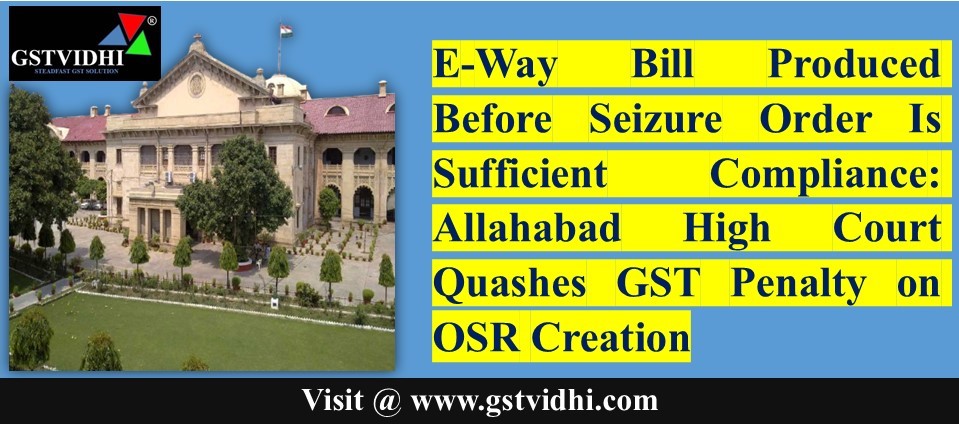
E-Way Bill Produced Before Seizure Order Is Sufficient
Compliance: Allahabad High Court Quashes GST Penalty on OSR Creation
Introduction
The Goods and Services
Tax (GST) regime has a clear mandate on the requirement of documents like e-way
bills during the transport of goods. But what happens if the e-way bill is
generated after interception but before the seizure order? Can
penalty still be imposed?
The High Court of
Judicature at Allahabad addressed this key procedural question in M/s OSR
Creation vs State of U.P. and Others, delivering a reasoned verdict that
underscores the importance of intent and timing of compliance,
setting aside penalty orders issued without evidence of tax evasion.
Case
Overview
- Case Title:
M/s OSR Creation vs State of U.P. and Others
- Case No.:
Writ Tax No. 1914 of 2024
- Neutral Citation No.:
2025:AHC:13336
- Court:
Court No. 2, High Court of Judicature at Allahabad
- Reserved On:
23 January 2025
- Delivered On:
27 January 2025
Factual
Background
M/s OSR Creation, a
proprietorship firm based in East Delhi and engaged in furniture manufacturing
and trading, had sold goods to Lotus Herbal Private Limited, NOIDA on 21
November 2022. The following sequence of events unfolded:
1. Tax
invoice and goods receipt (G.R.) were prepared,
but due to technical errors, the e-way bill could not be generated
immediately.
2. Owing
to urgency from the buyer’s end, the goods were dispatched with strict
instructions not to enter U.P. without the e-way bill.
3. The
e-way bill was eventually generated at 4:59 PM on 21.11.2022.
4. However,
the vehicle was intercepted at 6:00 PM on the same day by Mobile
Squad 6, Noida.
5. The
penalty order was passed on 22.11.2022, and a subsequent appeal was
dismissed on 09.08.2023.
The petitioner approached
the High Court seeking quashing of both orders.
Petitioner’s
Submissions
The petitioner argued the
following points:
1. E-way
Bill Produced Before Seizure Order:
o Though
the e-way bill was not available at the time of interception, it was produced
before passing of the seizure order, which is evident in Annexure 11
(page 65 of the petition).
2. No
Tax Evasion Intent:
o There
was no intent to evade tax, and this was not recorded by any authority
during adjudication.
3. Reliance
on Precedent:
o Cited
the Allahabad High Court’s judgment in M/s Bans Steel vs State of U.P.,
where it was held that producing valid documents before seizure cures the
procedural lapse.
Respondent’s
Submissions
The State’s
representative contended:
1. E-way
Bill Generated After Interception:
o The
vehicle was detained at 4:26 PM, while the e-way bill was generated
later.
o It
was an “afterthought” initiated only after the interception.
2. Possibility
of Evasion:
o If
the vehicle hadn’t been intercepted, the petitioner could have potentially
evaded tax.
3. Support
from Other Case Law:
o Relied
on M/s Akhilesh Traders vs State of U.P., where penalty was upheld due
to non-production of documents during or after interception.
Issues for
Consideration
The Hon’ble High Court
considered the following:
1. Was
the e-way bill produced before the passing of seizure order?
2. Is
there any evidence of intent to evade tax?
3. Can
penalty under Section 129 of the UPGST Act be justified on mere procedural
delay in e-way bill generation?
Observations
of the Court
Justice Piyush Agrawal
conducted a detailed examination of the case record and observed:
1. E-way Bill Was
Produced Before Seizure Order
- The e-way bill was generated
before the seizure order was passed.
- This fact is undisputed and
recorded in the penalty order itself.
“The petitioner along
with its reply to the show cause notice has produced the e-way bill before
passing of the seizure order… The same was not accepted, treating it as an
afterthought.”
2. No Defect in E-way
Bill Found
- The e-way bill, once produced, was valid
and complete.
- No authority recorded any discrepancy
or flaw in the e-way bill at any stage.
3. No Finding of Malafide
Intention
- Authorities did not record any
finding that the petitioner intended to evade tax.
- Absence of such finding makes the
penalty unsustainable in law.
4. Precedents Favor
Petitioner
- Relied on M/s Bans Steel
(2024:AHC:129150), where the e-way bill was produced before seizure, and the
Court held that proceedings could not be sustained.
- Distinguished M/s Akhilesh Traders,
since in that case, no documents were produced even before the order
was passed, unlike here.
Findings
“Once the e-way bill was
produced before passing of the seizure order, it could not be said that there
was any contravention of the provisions of the Act being made by the
petitioner.”
Thus, the procedural
lapse stood cured, and no mens rea (intent to evade tax) was
established.
Judgment
and Directions
The Hon’ble Court issued
the following directions:
- The penalty order dated 22.11.2022
and the appellate order dated 09.08.2023 were quashed.
- The writ petition was allowed.
- Any amount deposited by the
petitioner was directed to be refunded as per law.
Conclusion:
Intent and Timing Matter More Than Procedural Perfection
This ruling from the
Allahabad High Court underscores a key principle of GST law—substance over
form. Procedural compliance, such as timely e-way bill generation, is
vital, but unintentional and cured lapses must not attract punitive
actions.
When taxpayers correct
the error before final adverse orders and where there is no
indication of fraud, courts are inclined to protect genuine trade
practices.
This judgment reinforces
the doctrine that “technical errors without malafide intent do not merit
penalties.”
Disclaimer: All the Information is based on the notification, circular and order issued by the Govt. authority and judgement delivered by the court or the authority information is strictly for educational purposes and on the basis of our best understanding of laws & not binding on anyone.
Find the Attachment (Press on Click Here )
Click here